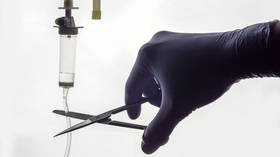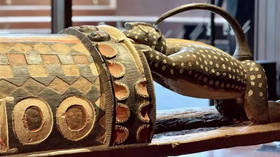'It keeps happening,' rape survivor says as activists protest abuse by US military in Japan
Protests against American military presence in Japan continued on Saturday, as the country’s defense minister lodged a formal complaint over the latest case of alleged murder and rape of a young Japanese woman by a US military base employee.
Gen Nakatani visited the US Kadena Air Base on Saturday to formally protest the alleged crime to its commander Lt. Gen. Lawrence Nicholson.
"I deliver a strong message of regret and at the same time make a protest,” he said as cited by the public broadcaster NHK.
Nicholson offered “heartfelt prayers and condolences” to the victim's family.
Kenneth Franklin Gadson, a 32-year-old former Marine, who goes by his Japanese wife's family name of Shinzato, was arrested by the Okinawan police on Thursday. He confessed to raping and killing Rina Shimabukuro, 20, who went missing in late April.
Japanese officials including Prime Minister Shinzo Abe expressed outrage over the latest in a string of crimes, which has been poisoning US-Japanese military ties for decades. The country’s Foreign Ministry filed a formal complaint over the case as well.
The news of the arrest sparked protests across Japan, which continued on a smaller scale on Saturday. Critics of the deployment of US troops in Japan complain of the crimes committed by American personnel against local residents, environmental damage done by US bases and other negative sides. Okinawa Island hosts roughly half of all American troops in Japan, and sentiment against the arrangement are especially strong there.
“Vehicles with Y numbers should not be allowed to leave the base,” an activist told The Asahi Shimbun newspaper during a small Saturday protest in front of a US base. He was referring to license plates on vehicles used by US military personnel and civilian base staff.
Cases like Shimabukuro’s have been happening in Japan for over seven decades, but the governments of both countries and the media are not doing enough to address the problem, Catherine Jane Fisher, an activist supporting the victims of rape by US bases personnel in Japan, told RT.
“They need to stop trying to cover up the cases. We need to start from the beginning and educate people, including the police, medical professionals, judges, government officials. They said in conversations with me that they basically do not know how to handle military rape cases. And each time it happens, the US military and the Japanese government say ‘we will make sure this would never happen again’ but it just keeps on happening,” she said.
READ MORE: New Okinawa base fueling anti-US sentiment as DefSec Ash Carter visits Japan
Fisher knows this from her own experience. The Australian national was raped by a US base employee in Japan in 2002 and it took her years to make the Japanese government even admit that the crime happened at all. After being awarded damages by a Japanese court under a civil lawsuit she spent a decade to track down her assailant and bring him to court, as officials in Japan and the US remain uncooperative.
The scandal comes just before a visit by US President Barack Obama, who is going to attend a G7 meeting hosted by Japan next week. He will also pay his respects at the Hiroshima memorial of American nuclear bombings of Japan during World War II, becoming the first sitting US president to do so.













